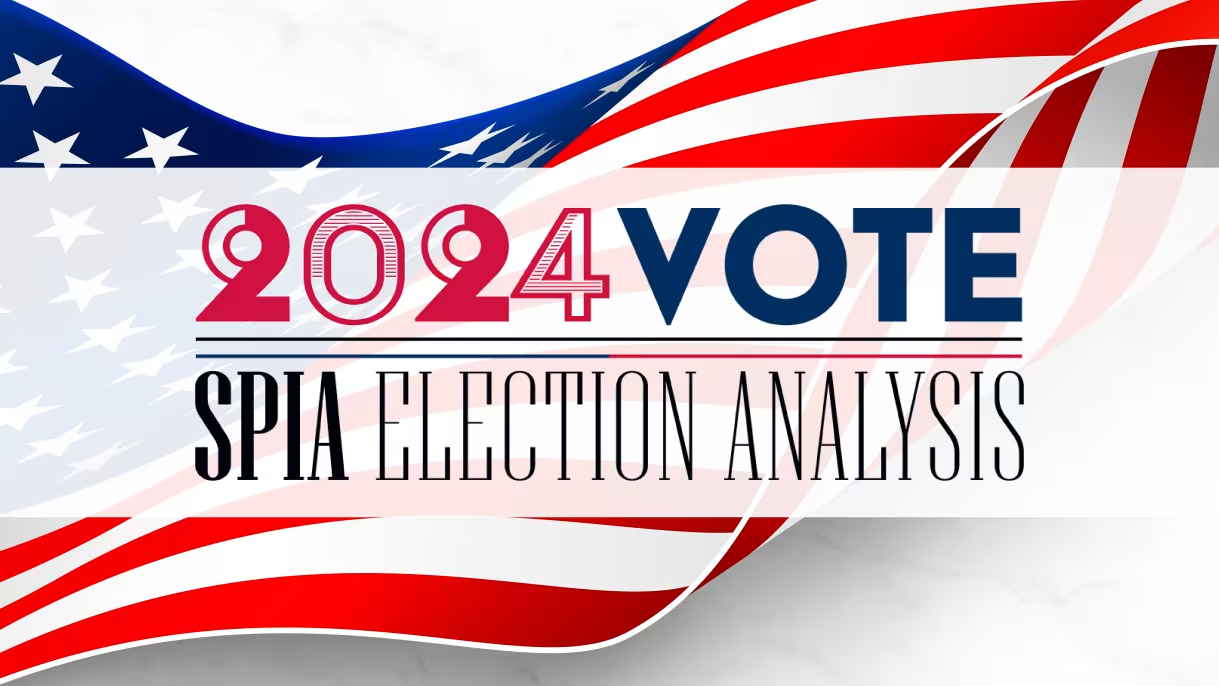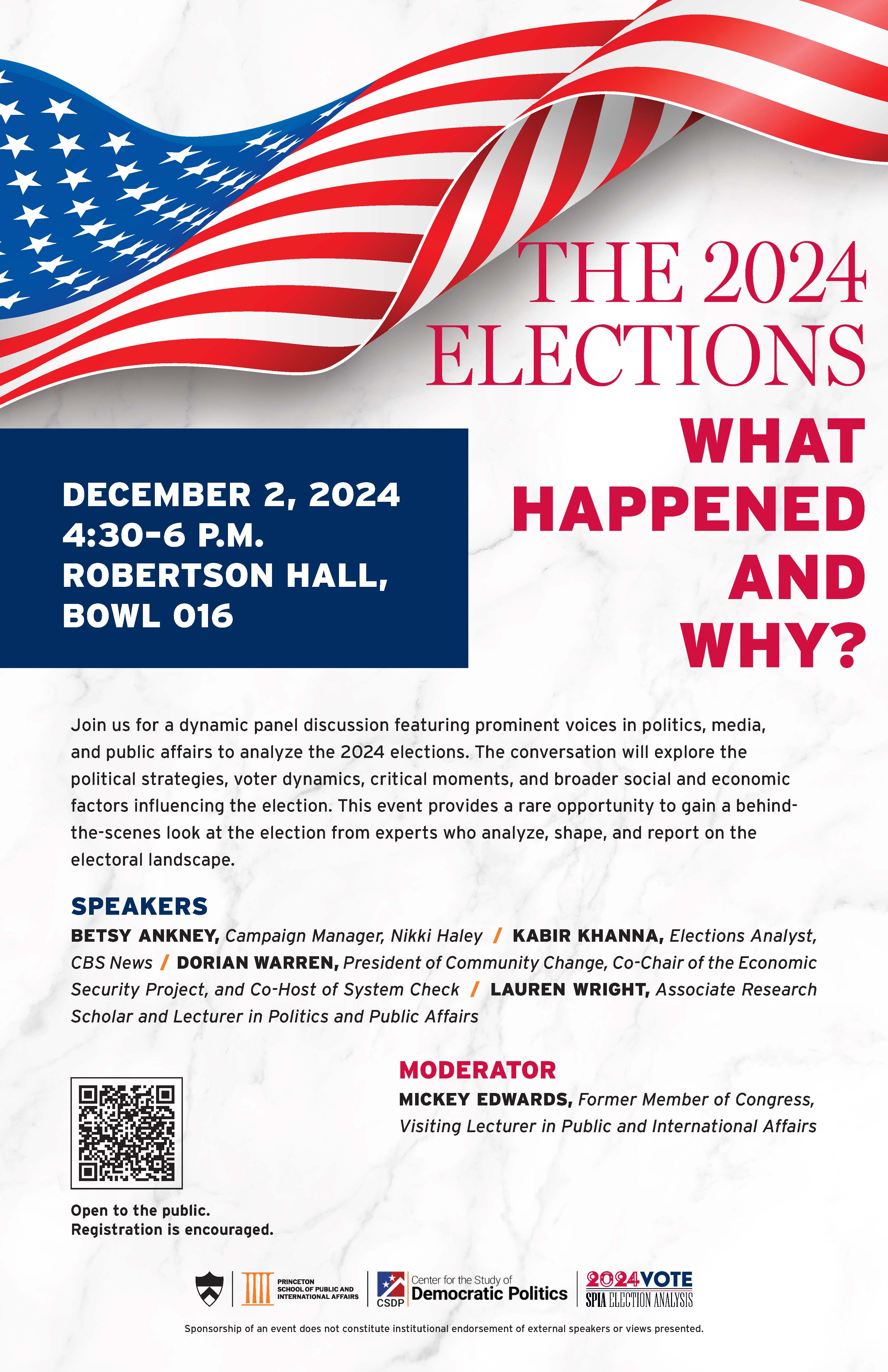

The 2024 Elections: What Happened and Why?

Join us for a dynamic panel discussion featuring prominent voices in politics, media, and public affairs to analyze the 2024 elections. The conversation will explore the political strategies, voter dynamics, critical moments, and broader social and economic factors influencing the election. This event provides a rare opportunity to gain a behind-the-scenes look at the election from experts who analyze, shape, and report on the electoral landscape.
Speakers
Betsy Ankney, Campaign Manager, Nikki Haley
Betsy Ankney is a political strategist with over 15 years of experience on tough campaigns. She has been involved in campaigns and Super PACs at the national and state level and played a role in some of the biggest upsets in Republican politics.
She has been an advisor to Ambassador Nikki Haley since 2021, serving as Executive Director for Stand for America PAC and most recently as Campaign Manager for Nikki Haley for President. After starting with zero dollars in the bank and 2% in the polls, the campaign defied the odds, raised $80 million, and Nikki Haley emerged as the strongest challenger to Donald Trump.
Ankney served as the Political Director of the National Republican Senatorial Committee for the 2020 cycle. She advised Senate campaigns across the country, working directly with candidates and their campaigns on budgets, messaging, and fundraising.
Prior to her work at the NRSC, Ankney managed multiple statewide campaigns, including Bruce Rauner for Governor in Illinois and Ron Johnson for Senate in Wisconsin. For her work on Ron Johnson's race, Ankney was named "Campaign Manager of the Year" by the American Association of Political Consultants for 2016.
Ankney got her start in politics at the 2008 Republican National Convention and served in various roles at the Republican National Committee as well as on multiple campaigns and outside efforts. She serves on the boards of The Campaign School at Yale and The American Association of Political Consultants.
Kabir Khanna, Deputy Director, Elections, CBS News
Kabir Khanna works at the intersection of social science and data journalism, covering public opinion and voter behavior for CBS News. That involves original research, data viz, as well as producing stories and segments on elections, polls, and politics. On election nights, he analyzes live results, projects races, and manages our team at the network decision desk. You'll also occasionally find him breaking down data on the air.
Kabir’s background is in quantitative social science. He earned a Ph.D. from Princeton, where he instructed graduate and undergraduate students, developed statistical software, and published academic research in journals like Harvard Data Science Review, Political Analysis, and Political Behavior. Kabir previously earned an M.A. in psychology from Stanford and conducted research for various federal agencies at Westat.
Dorian Warren, President of Community Change, Co-Chair of the Economic Security Project, and Co-Host of System Check
Dorian Warren is the president of Community Change, co-chair of the Economic Security Project and co-host of System Check. A progressive scholar, organizer, and media personality, Dorian has worked to advance racial, economic, and social justice for over two decades. He previously held the position of vice president at Community Change. He taught for over a decade at the University of Chicago and Columbia University, where he was co-director of the Columbia University Program on Labor Law and Policy. He also worked at MSNBC, where he was a contributor and host, as well as the executive producer of “Nerding Out” on MSNBC’s digital platform. He serves on the boards of Working Partnerships USA, the Leadership Conference Education Fund Board, the National Employment Law Project, and The Nation magazine, among others.
As a commentator on public affairs, Warren has appeared regularly on television and radio including NBC Nightly News, ABC, MSNBC, CNN, CNBC, BET, BBC, NPR, Bloomberg, & NY1, among other outlets. He has also written for The Nation, Huffington Post, Newsweek, Salon, Washington Post, New York Times, Medium, Ebony.com, and Boston Review.
Lauren Wright, Associate Research Scholar and Lecturer in Politics and Public Affairs
Lauren A. Wright is Associate Research Scholar and Lecturer in Politics and Public Affairs at Princeton University, where she teaches courses on The Presidency and Executive Power, Women and Politics, and Political Communication. Wright is the author of Star Power: American Democracy in the Age of the Celebrity Candidate (Routledge, 2020) and On Behalf of the President: Presidential Spouses and White House Communications Strategy Today (Praeger, 2016). A frequent guest political analyst, she has appeared on BBC, CBS, CNN, C-SPAN, MSNBC, and Fox News. Her research and commentary have been featured in The New York Times, The Washington Post, USA Today, The San Francisco Chronicle, Glamour, The Atlantic, Newsweek, U.S. News & World Report, The Hill, and The Huffington Post. Wright graduated summa cum laude, Phi Beta Kappa from Wake Forest University and received a Ph.D. in Government from Georgetown University with a concentration in American politics and political methodology. She is a board member of The White House Transition project and previously served as Field Representative for Meg Whitman’s campaign for Governor of California.
Moderator
Tali Mendelberg, John Work Garrett Professor of Politics, Co-Director of CSDP
Tali Mendelberg is the John Work Garrett Professor of Politics at Princeton University, co-director of the Center for the Study of Democratic Politics, and director of the Program on Inequality at the Mamdouha S. Bobst Center for Peace and Justice. Her book The Race Card: Campaign Strategy, Implicit Messages, and the Norm of Equality, won the American Political Science Association's Woodrow Wilson Foundation Award for "the best book published in the United States during the prior year on government, politics or international affairs." The Silent Sex: Gender, Deliberation and Institutions, coauthored with Chris Karpowitz, has also won distinctions. Earlier versions of its parts received the APSA Paul Lazarsfeld Award for the best paper in Political Communication (twice), the APSA Best Paper Award in Political Psychology (twice), the Carrie Chapman Catt Prize for Research on Women and Politics (honorable mention), and was in the top-ten most downloaded APSR articles in 2013.
She was awarded the Erik H. Erikson Early Career Award for Excellence and Creativity in the Field of Political Psychology. She has published articles in the American Political Science Review, American Journal of Political Science, Journal of Politics, Public Opinion Quarterly, Perspectives on Politics, Political Behavior, Political Psychology, Political Communication, and others. Her work has been supported by by a Guggenheim fellowship, the Radcliffe Institute, the Russell Sage Foundation, the Center for Advanced Study in the Behavioral Sciences, the National Science Foundation, the University of Pennsylvania, Harvard University, and Princeton University’s Center for Human Values, Center for the Study of Democratic Politics, and Mamdouha S. Bobst Center for Peace and Justice. In 2018 she was elected to the American Academy of Arts and Sciences. She holds a PhD from the University of Michigan. Her areas of specialization are political communication; gender; race; class; public opinion; political psychology; and experimental methods.
Sponsorship of an event does not constitute institutional endorsement of external speakers or views presented.

